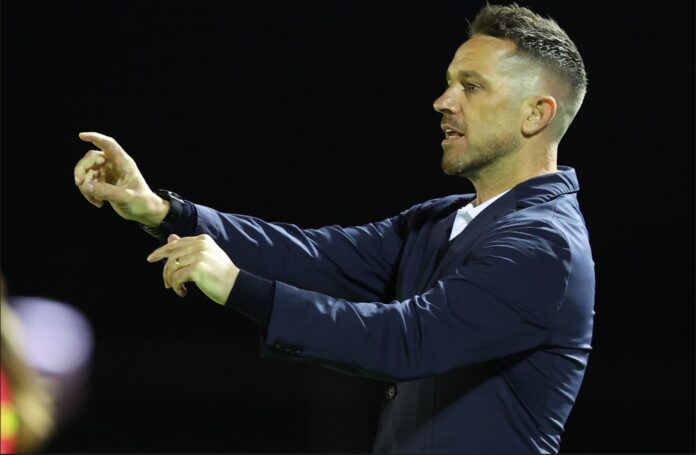Paul Temple is a British football coach with over 20 years of experience working across New Zealand’s football landscape, both at the club and international levels. Most recently, he served as Head Coach of the Wellington Phoenix Women in the A-League Women’s competition, where he implemented a performance-driven culture built around tactical intelligence, player development, and professional standards. Prior to this role, Temple led the club’s academy program, establishing one of the most productive youth systems in the country. Under his leadership, the academy produced several players who went on to earn international caps and secure professional transfers, strengthening the club’s reputation as a development hub.
Temple has coached at five FIFA World Cups, working with New Zealand’s national youth teams in both men’s and women’s football. These experiences on the global stage enhanced his expertise in preparing squads for elite competition, with responsibilities ranging from tactical preparation and match analysis to managing high-pressure tournament environments. He is widely recognized for his ability to simplify complex systems into clear tactical frameworks, allowing players to perform confidently with defined roles and responsibilities.
His coaching philosophy centers on a player-first approach, where individual growth is seen as integral to team success. Temple emphasizes leadership, accountability, and long-term development, and is known for creating environments that challenge athletes to take ownership of their progress while fostering trust and collective identity. His values-led leadership has earned the respect of both players and colleagues across the football community.
With a proven track record of building high-performance teams, advancing young talent into senior football, and navigating the demands of international competition, Paul Temple stands out as one of the most influential coaching figures in New Zealand football. His long-term impact continues to be felt through the players he has developed, the systems he has built, and the culture of professionalism he has instilled at every level.
Our Exclusive Interview with Paul Temple
Who is Paul Temple outside of football?
Firstly, I’m a dad and husband, I have two daughters who are very sporty so taking them to practices and watching them compete with my wife is a big part of the week. As a family we like to get outside and explore as much as possible, we’re an active family.
What has been the most defining moment of your coaching career so far?
I’d say there have been two defining moments for me, firstly being named Head Coach for NZ at the 1st ever Women’s World Cup in 2008, New Zealand was hosting so the media spotlight was huge and I was only 26yrs old, it gave me a taste of football at a whole new level, when we won out last group game that will be remembered forever.
Secondly would be the 2021 U20 Men’s World Cup in Argentina. We (New Zealand) played Argentina the hosts and to be on the sideline to witness the level of play was just incredible. We had a good team and had gotten through the group stage but seeing the differences when you play against the World’s best players was eye-opening in a positive way. The first and only game I enjoyed losing.
How has living and working in a multicultural football environment like New Zealand shaped your coaching perspective?
Drastically, I’m English born but consider myself a kiwi. I love New Zealand, the Maori culture is woven into its people in so many ways. I think the direct translation into my coaching would be humbleness and kindness. I’ve become a lot calmer when coaching and pay much more attention to human interaction. There is a Maori saying “He aha te mea nui? He tangata, he tangata, he tangata” which means “What is the most important thing, it’s the people, the people, the people.”
What is your core philosophy when it comes to developing young players?
We play a team sport, and everyone has an important role in the team but when developing younger players, it’s about understanding how individual journeys look so different and progress at different times. So, you must treat each player as an individual on their own personal journey, be patient with them and never presume it will go a certain way. The art of coaching is knowing when to push hard, when to ease off and when an arm around the shoulder is needed.
What have been the biggest challenges and lessons from leading both academy and senior teams?
The biggest challenge in coaching senior teams is the result at the weekend defines everything and how you are perceived. It’s a harsh environment because you could have a great culture and the players are improving a lot, but all most people look at is what happened in the game, you feel as a coach you’re constantly trying to justify what’s happening with results which is a challenge.
With the Academy the biggest challenge is timing. You can have an educated guess when a player is ready to progress into the 1st team but sometimes the timing doesn’t feel right, they might be injured, might be lacking confidence and off form but then you can’t control when they may be needed and the circumstances above them dictate when they make a debut or not. Ideally you want them to be feeling confident, playing well and be ready for a 1st team debut but in my experience, it doesn’t work like that very often so that is a challenge because it’s their dream and opportunity to establish a career.
What are your future goals and plans in football?
I find coaches have similar goals to players, I want to coach at the highest level possible, I want to work with the best players and the best management teams. I’ve built myself to be adaptable to any environment. I’d be happy to work within Men’s, Women’s or Youth. I just want to feel excited by the project I’m involved in and enjoy working with the people around me.

